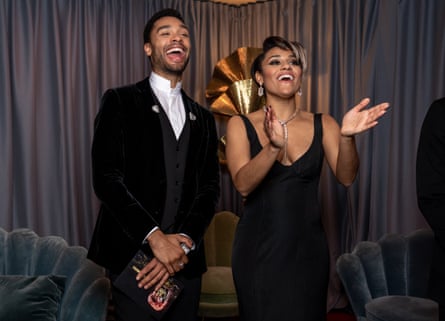Is Bafta’s work to increase diversity in danger of being undone? | Baftas 2023
Like its fellow awards-giving organisation Ampas (Academy of Motion Picture Arts and Sciences), the British Academy of Film and Television Arts has expended considerable energy in recent years in correcting perceived imbalances in the diversity of its nominations and award winners. Hence the consternation Bafta must privately be feeling that no people of colour were voted as winners of its top prizes at the 2023 edition, where German war film All Quiet on the Western Front emerged as the most rewarded, with seven Baftas, including best film and best director.
This year’s Bafta film awards had looked at first if they had avoided the controversy that hit the Oscars, which saw outrage after a grassroots campaign for Andrea Riseborough’s performance in the low-budget To Leslie resulted in a best actress nomination, presumably partly responsible for displacing apparent certainties Viola Davis for The Woman King and Danielle Deadwyler for Till. Both David and Deadwyler were nominated for Baftas, but were passed over in the final vote for Cate Blanchett’s performance in Tár. Likewise Angela Bassett, Hong Chau and Dolly de Leon lost out in the best supporting actress race, Ke Huy Quan and Micheal Ward for best supporting actor, and Daryl McCormack for best actor. Gina Prince-Bythewood was the only woman nominated in the directing category, and also lost, while McCormack, Naomi Ackie and Sheila Atim failed to win the public vote in the rising star award.
It is a matter of opinion of course as to the comparative qualities of Blanchett v Deadwyler, or Bassett v Kelly Condon and, like the Oscars, the voting pool of the Baftas is made up of industry professionals, whose perspectives and motivations will be different from observers on social media and elsewhere. There is also no reason to think that an Asian-American superhero film ought to resonate more with (mostly) UK voters than a powerful historical film about a European war. But as with the Oscars, Bafta has taken steps to widen the pool of its voting membership cohort as well as more stringently defining the films that can be eligible to ensure the playing field is as level as possible.

In 2016, Bafta made it a requirement that nominated films in two categories adhere to the BFI’s Diversity Standard (designed to establish minimum levels of participation and representation of minorities and socially disadvantaged people), while inviting significant numbers of female and minority ethnic members.
While some progress appeared to be made – in 2019, Rami Malek and Mahershala Ali won the best actor and best supporting actor Baftas respectively, Spike Lee’s BlacKkKlansman won best adapted screenplay and Letitia Wright the rising star award – a further row erupted when no female directors or actors of colour were nominated in 2020. Another overhaul was subsequently put in place, including bringing in 1,000 new members, giving a greater role to selection committees, and capping publicity spending. Bafta’s then CEO, Krishnendu Majumdar, said at the time: “We need to reflect society, not reflect the industry, I think that’s the key thing because the industry ain’t good enough at the moment.”
In some ways, the changes appeared to have an immediate impact: in 2021 four of the best director nominees were women (including the eventual winner, Chloé Zhao for Nomadland) and multiracial drama Rocks actually led the nominations count with seven (though only ended up winning one, for casting). The 2022 edition also made positive strides: deafness drama CODA won two awards, Jane Campion won best director, and Will Smith and Ariana DeBose won best actor and supporting actress respectively.
after newsletter promotion

It is certainly possible to argue that the voting reflects the films, and any problem at awards time is a knock-on effect. Would it have served justice for Michelle Yeoh to have beaten Blanchett, or McCormack to have defeated Butler? Like weather v climate, it’s hard to argue over specific cause-and-effect, other than to say that the statistical trend is alarming.
Furthermore, a wider concern is that the British Asian population of the UK is particularly badly served by Bafta, and the British film industry in general: the 2021 census identified 9.3% (around 5.5 million people) identifying as “Asian, Asian British or Asian Welsh” – whose only representative in the main prizes this year is director Sally El-Hosaini, whose film The Swimmers was one of 10 up for best British film. It can’t be a great situation when nearly 10% of the population is practically invisible at the nation’s film awards.
Like its fellow awards-giving organisation Ampas (Academy of Motion Picture Arts and Sciences), the British Academy of Film and Television Arts has expended considerable energy in recent years in correcting perceived imbalances in the diversity of its nominations and award winners. Hence the consternation Bafta must privately be feeling that no people of colour were voted as winners of its top prizes at the 2023 edition, where German war film All Quiet on the Western Front emerged as the most rewarded, with seven Baftas, including best film and best director.

This year’s Bafta film awards had looked at first if they had avoided the controversy that hit the Oscars, which saw outrage after a grassroots campaign for Andrea Riseborough’s performance in the low-budget To Leslie resulted in a best actress nomination, presumably partly responsible for displacing apparent certainties Viola Davis for The Woman King and Danielle Deadwyler for Till. Both David and Deadwyler were nominated for Baftas, but were passed over in the final vote for Cate Blanchett’s performance in Tár. Likewise Angela Bassett, Hong Chau and Dolly de Leon lost out in the best supporting actress race, Ke Huy Quan and Micheal Ward for best supporting actor, and Daryl McCormack for best actor. Gina Prince-Bythewood was the only woman nominated in the directing category, and also lost, while McCormack, Naomi Ackie and Sheila Atim failed to win the public vote in the rising star award.
It is a matter of opinion of course as to the comparative qualities of Blanchett v Deadwyler, or Bassett v Kelly Condon and, like the Oscars, the voting pool of the Baftas is made up of industry professionals, whose perspectives and motivations will be different from observers on social media and elsewhere. There is also no reason to think that an Asian-American superhero film ought to resonate more with (mostly) UK voters than a powerful historical film about a European war. But as with the Oscars, Bafta has taken steps to widen the pool of its voting membership cohort as well as more stringently defining the films that can be eligible to ensure the playing field is as level as possible.

In 2016, Bafta made it a requirement that nominated films in two categories adhere to the BFI’s Diversity Standard (designed to establish minimum levels of participation and representation of minorities and socially disadvantaged people), while inviting significant numbers of female and minority ethnic members.
While some progress appeared to be made – in 2019, Rami Malek and Mahershala Ali won the best actor and best supporting actor Baftas respectively, Spike Lee’s BlacKkKlansman won best adapted screenplay and Letitia Wright the rising star award – a further row erupted when no female directors or actors of colour were nominated in 2020. Another overhaul was subsequently put in place, including bringing in 1,000 new members, giving a greater role to selection committees, and capping publicity spending. Bafta’s then CEO, Krishnendu Majumdar, said at the time: “We need to reflect society, not reflect the industry, I think that’s the key thing because the industry ain’t good enough at the moment.”
In some ways, the changes appeared to have an immediate impact: in 2021 four of the best director nominees were women (including the eventual winner, Chloé Zhao for Nomadland) and multiracial drama Rocks actually led the nominations count with seven (though only ended up winning one, for casting). The 2022 edition also made positive strides: deafness drama CODA won two awards, Jane Campion won best director, and Will Smith and Ariana DeBose won best actor and supporting actress respectively.
after newsletter promotion

It is certainly possible to argue that the voting reflects the films, and any problem at awards time is a knock-on effect. Would it have served justice for Michelle Yeoh to have beaten Blanchett, or McCormack to have defeated Butler? Like weather v climate, it’s hard to argue over specific cause-and-effect, other than to say that the statistical trend is alarming.
Furthermore, a wider concern is that the British Asian population of the UK is particularly badly served by Bafta, and the British film industry in general: the 2021 census identified 9.3% (around 5.5 million people) identifying as “Asian, Asian British or Asian Welsh” – whose only representative in the main prizes this year is director Sally El-Hosaini, whose film The Swimmers was one of 10 up for best British film. It can’t be a great situation when nearly 10% of the population is practically invisible at the nation’s film awards.
